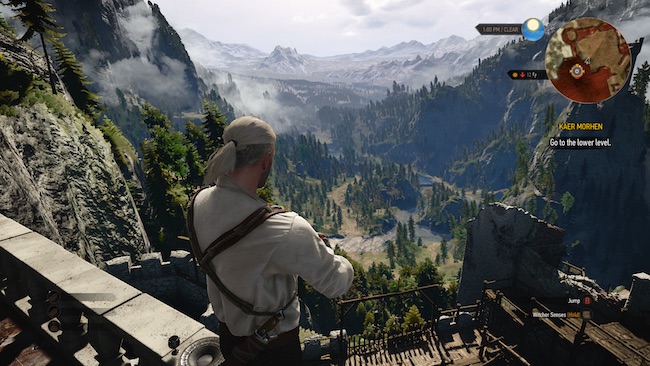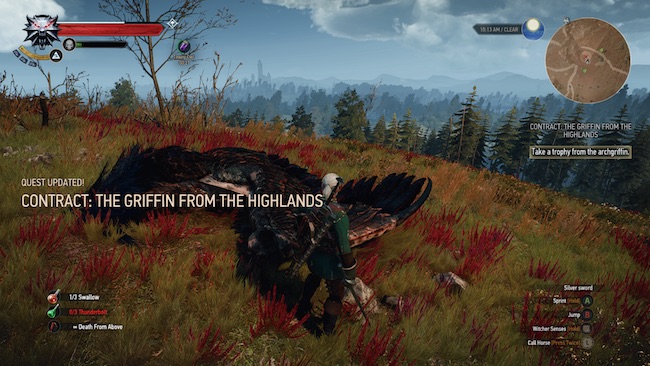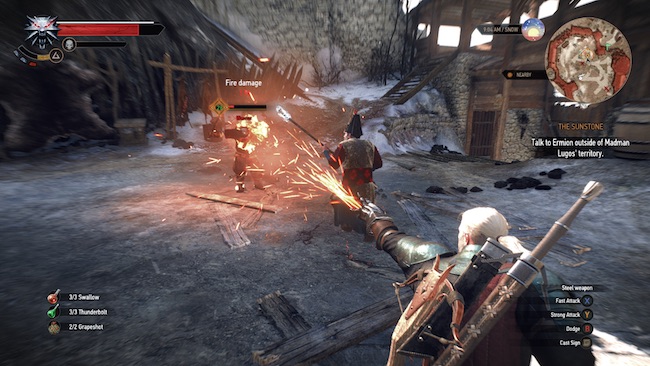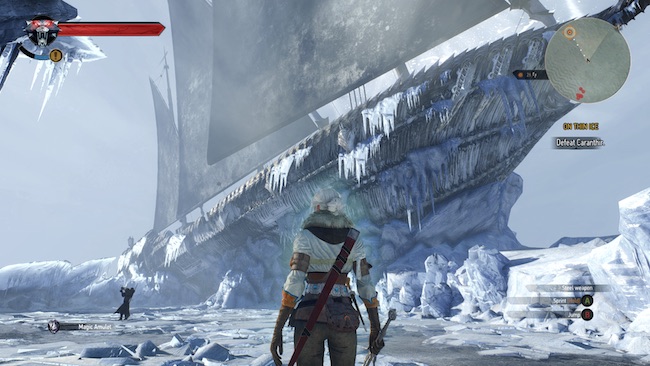
CD Projekt RED are one of the few larger game developers that I have the utmost respect for. Naturally, I am a fan of their work, but I also find it so refreshing that despite continued success, they are still so passionate in everything they do. In every copy of The Witcher 3: Wild Hunt, there is a special thank you note to all the fans; something that feels almost out of place in the AAA gaming world. The Witcher 3 was a massive undertaking and it’s clear they’ve put their heart and soul into it; never mind that they’ve sold 4 million copies at the time of writing, CDPR has been working non-stop to release regular patches and free DLC to everyone who owns the game. How it should be, in an ideal industry.
I was a big fan of The Witcher 2: Assassin’s of Kings, having played the Enhanced Edition on Xbox 360 in 2012. What I enjoyed most about it was that it had a lot of familiar elements, as well as a unique and foreign vibe that set it apart from other RPGs. This is not a typical Tolkien-inspired universe, despite the presence of Elves, Dwarves and Halflings. There is a lot of European and Scandinavian influence behind the Witcher mythology not often seen in Western media, with the game focusing strongly on characters, politics and consequence. In fact, The Witcher 2 is the only game which I believe has a genuinely impactful choice to make. It was for this reason I was keen to get my hands on The Wild Hunt, and to see how these principles could be applied to an open-world game. And, wow, talk about ambition!

The Witcher tells the story of Geralt of Rivia, a mutated veteran renowned for his monster hunting abilities and political neutrality. While this is the final instalment of a beloved franchise, anyone can still go in confidently without any prior knowledge. Just like the previous game, there are a lot of callbacks to previous events that will be rewarding for those who understand the references, but there’s not anything of consequence to this story that risks isolating newcomers. The Witcher 3 is vast and wonderful, and when I say vast, I mean it’s arguably the largest game I’ve ever played. What makes it feel so big is not just the size of the map, but how deeply the narrative runs throughout the world and with its inhabitants. The main storyline follows Geralt’s quest to track Ciri, his estranged adopted daughter – who has returned after many years, and is on the run from the otherworldly Wild Hunt. It’s more of a personal tale than most fantasy epics, sporting a universe that resonates so profoundly because of the compelling cast of characters that supports it.
As much as I enjoy open-world experiences, I’ve never felt the genre has been able to truly surpass the quality of linear storytelling. It’s not because I don’t believe it is possible, I just don’t think any games have truly mastered the balance between a quest line and the vast freedom an open-world provides. In saying that, during the time I spent playing Geralt, I actually felt as if I was living the life of a Witcher, and not simply playing into the cliche of another hero who had to save the world. The main quest line was compelling, well-written and executed brilliantly, but the plot was never so pressing that other activities felt out of place or like you were going to get distracted and stop caring. As I visited each town, I naturally felt compelled to dive into contracts and all other manner of activities a Witcher would indulge in. It didn’t matter what I did, or what order I completed tasks because it all organically fit together, as if what you were doing was always what you were supposed to be doing. For this, it is a crowning achievement for the genre.

The reason why the game succeeds in this area is because there is no filler content; everything has a purpose, even the most basic tasks. Often, I found that many of the secondary objectives were equal in quality to the main storyline; some of which even had a direct impact on the outcome of major events. Choice and consequence is something that’s never straightforward in these games. At times, consequences from seemingly unrelated quests can cross paths (for better or worse), and when this happens, it’s likely at a point where the time to reload an old save file has well and truly expired. The Witcher 3 has been talked about as a mature game, as well as one that loves to dabble in a moral grey area. There is no hesitation here with tackling real-world issues such as racism, sexism, domestic violence and all manner of other awful traits the worst of humanity are guilty of. When it’s done right, the Witcher delivers some of the most compelling character narratives of any RPGs to date. Although, it’s not out to take itself seriously to a fault either.
As much as the experience is story-driven, there are still so many other things you can do almost immediately. The game gives you complete freedom pretty much from the start, and this is where you can forge your own adventure by taking part in optional activities. For example, competing in the fighting league, hunting legendary monsters, searching for lost treasure, and, my personal favourite: Gwent. This is a replacement for dice-poker, and a sure winner for any fan of Magic: The Gathering. I also love that there is no level scaling whatsoever. You can punish yourself by tackling enemies above your skill level, as well as retread your steps to decimate earlier regions of the game. In particular, I thought the monster contracts were well done. There are special tactics and a backstory for every target, with a core focus on brewing the best oils and potions to be victorious. Combat, in general, can grow a little repetitive after you learn the ropes, so it’s great that these contracts exist to push the mechanics and employ a greater need for strategy.

Personally, I’ve always found the controls in The Witcher series to be a little awkward; which I know was a barrier to entry when it launched on consoles especially. In my opinion, the inventory system has also suffered in the past from being a bit garbled and overwhelming. While there are definitive improvements in Witcher 3, it’s still not quite there yet. The controls are definitely manageable with either mouse and keyboard or a controller, but they are not as precise or empowering as some other action RPGs. With a controller, this becomes most apparent when you’re in the middle of combat and need to trawl through the inventory to use a potion not assigned to a quick slot. You collect a lot of loot wherever you go, and with the games tiny font-size, it can sometimes feel like a chore trying to manage everything. It’s certainly a functional system, but it’ll definitely strain your patience and especially your eyes if you’re playing via a TV. But in saying that, core components such as the alchemy and crafting systems are very practical and well executed.
Fortunately, it’s quite easy to pick what you don’t need to keep, and rarely will you face the issue of being over-encumbered like with other loot-heavy RPGs. You’re never going to be overly wealthy in The Witcher 3, so selling off loot is a vital part of raising coin to get the things you need. I also like that there are tonnes of ingredients and crafting components that you organically pick up along the way. You can proactively farm specific ingredients, but it’s often quite fun after a long haul to see what you’ve collected and make a trip to the local blacksmith or merchant to sell off the junk and see what new oils, potions and components you can craft. What I especially enjoy about the potions system is that you only have to produce the main brew once, and then can meditate when able to replenish your health and stock using strong spirits. In particular, it’s the potion and oil system that sets the gameplay apart, adding a logical gameplay layer that fits perfectly into the world of being a Witcher. You just need to watch those toxicity levels!

Magic also has a large influence on your combat tactics, and I felt these mechanics were handled very well. It’s not a complicated system, after all you’re not a mage, so there are just five different signs to master. As you collect XP, Geralt naturally grows stronger, but, in line with most RPGs, you also receive points which are invested into growing various components of your character built. I also want to talk about some of the monster encounters too, because The Witcher arguably has some of the most unique and interesting enemies of any game I’ve played. It’s not just because they’re artistically incredible, it’s also the backstory that comes with each monster. They don’t simply exist just because. For example, a Noonwriath’s are the spirits of young girls who were murdered before their weddings, whereas a Botchling is an unwanted baby which never received a proper burial. Sometimes it feels like you’re in a horror/thriller, and it’s not always as simple as killing things. Sometimes it’s about putting a troubled creature at rest.
That’s the thing about the Witcher games, though. Nothing is ever black and white, and this is something I really enjoy about it. Outside of the combat, there are a lot of characters you’re going to be interacting with, and lots of crucial decisions to make. The game is just as much about politics as it about fighting monsters, and Geralt nearly always finds himself caught up in the thick things. A Witcher should be neutral, but personal interests will nearly always get in the way of that position. Playing as Geralt is never about being a paragon, it’s about what you can live with in order to accomplish your task and dealing the consequences that follow. I also appreciate how romance has been handled in The Witcher 3, and how sex is not simply the juvenile end-goal for engaging the opposite gender. Instead, Geralt finds himself caught between the affection of several compelling woman and the complications surrounding that. It’s a step forward for interactive romance: openly embracing sexuality, without devaluing the reward of meaningful relationships.

Of all the open worlds I’ve ever explored, this is without a doubt my favourite. There is simply a sense of magic about the air which doesn’t yet exist the same way in any other game. While not as diverse in visual design like with some high fantasy RPGs, it’s more so about how the world subtly changes as you travel. From the remote medieval villages to the large renaissance-inspired cities, and across the open sea to the Scandinavian-inspired Isles; everything has a unique sense of culture and I loved that about it. The game also employs a real-time day/night cycle and dynamic weather system which enhances the feeling of travelling long distances. When dusk hits, there is nothing quite like that blooming red glow that drapes the countryside; it’s so breathtaking at times that you simply have to stop at a cliff to take it all in. Likewise, the liberating sensation of just riding your horse through a thunderstorm is truly remarkable. It’s a living world that’s brimming with nature, wildlife, civilisation and culture, and it’s certainly the most convincing to date.
Let’s talk about graphics, though. It’s been both a hot and unfortunate topic of debate these past couple of weeks, with allegations the game had been “downgraded” since its initial reveal. Having played the game on a recently build PC, running ultra settings at 1080p/60FPS, I can’t say that I know of any other game that could graphically surpass The Witcher 3 across the board. In my opinion, it’s simply the whining of a vocal minority that enjoys controversy. Admittedly, there have been bugs and glitches to contend with, but this is not uncommon in an open-world game. Furthermore, I have never seen a developer more proactively provide patches for a game as CDPR have these past couple of weeks. The game is also very mod-friendly, so, almost immediately, there were various options for fans who wanted to enhance the experience further. Let’s not forget what’s most incredible here, and that’s the art. The Witcher 3 is a sensory delight, and it is supported by some of the best music and voice acting to ever be featured in a game.

 The most convincing open-world ever created
The most convincing open-world ever created
 Compelling characters and narrative scenarios
Compelling characters and narrative scenarios
 So much to do, with very minimal “filler” content
So much to do, with very minimal “filler” content
 Deep mechanics that encourage strategic play
Deep mechanics that encourage strategic play
 Outstanding art direction, VO and soundtrack
Outstanding art direction, VO and soundtrack
 General combat can grow a bit repetitive
General combat can grow a bit repetitive
 Controls and inventory are mildly awkward
Controls and inventory are mildly awkward
The Witcher 3: Wild Hunt is arguably the best story-driven open-world game ever created. This is not just because it has one of the most convincing ecosystems of any game to date, but because of how deeply the narrative is interwoven within all its components. Open-world RPGs have a history of pacing issues when it comes to delivering a strong primary quest line, but as a Witcher, you genuinely feel as if you’re living the life of a Monster Hunter. No matter what you choose to do, it’s always as if you’re exactly where you’re meant to be. For me, that meant countless hours of Gwent, hunting legendary beasts and getting caught up in political subterfuge as I attempted to track down Ciri and thwart The Wild Hunt. Along the way, I met countless compelling characters, faced the consequences of many difficult decisions, and walked away feeling as if I had left a unique mark on the world. There are a few mild annoyances to contend with at times, but as far as great stories go, this is a deeply personal tale and certainly one of gaming’s finest.
DISCLAIMER: this game was supplied to us by the publisher, and reviewed on PC across 100+ hours of gameplay.











